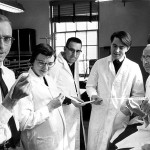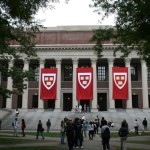Scientism vs. Methodological Naturalism: Responding to Qu Quine
by Dr. Christopher Baglow
Filed under Science
EDITOR'S NOTE: Today's post is in response to yesterday's article by atheist blogger Qu Quine, titled "Straw Man Scientism". Be sure to read Qu's article first.
Qu Quine has written a brief but clear description of methodological naturalism (MN), explaining the difference between this scientific approach to knowing and the blind “faith” of Scientism, the idea that only science is capable of putting us in touch with reality. The difference between the two is simple enough: the latter is an ideological stance, the former is a method, a way of knowing. Quine asserts that embracing the former does not require embracing the latter, and celebrates the power of MN to demonstrate falsehoods and to create a dependable path for attaining new and more certain knowledge.
To which I say, with profound conviction and no irony, “Vere!” and “Amen!” In knowing the material world as such, including the living things within it, methodological naturalism is the only useful method of which I am aware. And any attempt to restrain its practitioners on religious grounds or to discard it as scientism would be intellectual violence. As a theologian I do not want to quell Quine’s celebration of MN, but offer it an appreciative biography.
MN was born when the idea of Nature was born, when Greek philosophers began to discover “the regularity of phenomena as inhering in the natures of things and in the nature of the whole.” At the very same time was born the pagan critique of religion, best summarized by Cicero’s Cotta in his dialogue “On the Nature of the Gods”: “...the system's coherence and persistence is due to nature's forces and not to divine power.” This critique had developed over 800 years by the time of St. Augustine of Hippo, who adopted it entirely, as we can see in Book V of the Confessions, where we learn that it was the bad astronomy that the Manichees taught “as spiritual doctrine” that ended his long adherence to their sect. His words ring with MN as he notes the achievements of the (non-Manichee) astronomers, who
“With the mind and intellect...investigate these matters. They have found out much. Many years beforehand they have predicted eclipses of sun and moon, foretelling the day, the hour, and whether total or partial. And their calculation has not been wrong. It has turned out just as they predicted… On this basis prediction can be made of the year, the month of the year, the day of the month, the hour of the day, and what proportion of light will be eclipsed in the case of either sun or moon; and it happens exactly as predicted.”
In fact the Confessions breathes naturalism. Even while Augustine recounts his life to God and questions or thanks him for nearly every life-event he remembers, not once does Augustine invoke a miraculous intervention or direct divine activity. At one point he tells us that he moved to Rome for a career advantage; at another that he went there because God wanted him to meet Ambrose who leads him toward Christian baptism. Augustine narrates his life “in such a way that the sequence of events related is adequately accounted for, and yet...in such a way that those events are not adequately accounted for.” God is the reason for everything, but the direct cause of no specific thing. The message is clear:
“The divine action is not an action by a worldly agent, it does not insert itself into the sequence of motives and causes, it does not fill a gap in the account of Augustine's life. No event related in the Confessions is brought about by a situation inexplicable in terms of natural causes. Nature is a self-enclosed whole, not independent in its being from God, but a whole whose course is adequately explainable in terms of immanent natural causes.”1
Yet Augustine the naturalist becomes a member of the Catholic Church. Why did he find no obstacle there like the one he confronted in Manicheanism? Because the integrity of the natural world is a doctrine of the Catholic Church. This is why Augustine, as genius theologian and bishop, refuses to accept a literalist account of creation, why he posits a rudimentary version of evolution for the emergence of life forms from “the texture of the elements, com[ing] forth when they get the opportunity” (De Trinitate 3.9.16), and why his medieval disciple Thomas Aquinas will teach, paradoxically enough, the “hiddenness of divinity” as one of the two objects of God’s self-revelation (Summa Theologiae II-II.1.8).
God is not one among the things that exists. Rather, he gives the universe its free existence, and so MN must be the method of observing and knowing the world. Christian faith need not be invoked to use it, as Quine rightly notes. But neither is it an impediment to it; indeed, historically it has always been a progenitor of it.
As a final note, the “hiddenness of divinity” is only one of two things God has revealed to us. The other is the mystery of the humanity of Christ, in which God reveals himself as a human being to recreate the world, “not a mere appearance of a god in the likeness of men but fully present in history as a man, not a divine being peering out through a cloak of flesh, but a man.”2 Here, in the fulfillment of all things, resides the Resurrection, an event not historical in the same way as Augustine’s fateful decision to go to Rome, and the miracles of Christ and the saints, all of which foreshadow and prepare a new creation rather than replacing MN as an approach to this universe. Quine is right to reject a six-day formation of the earth, but putting the Resurrection in the same category is like putting the chicken back in the egg.
(Image credit: Timothy Webb)
Related Posts
Note: Our goal is to cultivate serious and respectful dialogue. While it's OK to disagree—even encouraged!—any snarky, offensive, or off-topic comments will be deleted. Before commenting please read the Commenting Rules and Tips. If you're having trouble commenting, read the Commenting Instructions.













